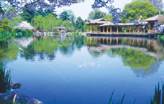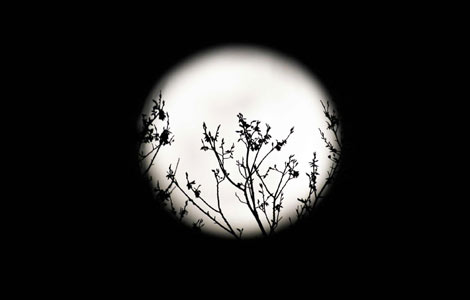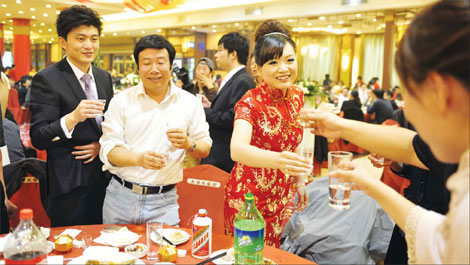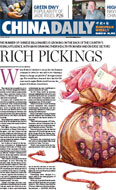Society
High spirits
Updated: 2011-03-15 11:04
By Liu Lu (China Daily)
|
|
Domestic liquor boom sparks plans for international expansion
When former US diplomat Henry Kissinger was paving the way for then president Richard Nixon's China visit, he remarked to former leader Deng Xiaoping over dinner that "if we drink enough Moutai we can solve anything".
Moutai is one of the many types of baijiu (white liquor), which has been lubricating the wheels of business in China for centuries and consumption of this iconic beverage is now bigger than ever.
According to Euromonitor, China's output of baijiu in 2010 reached 4 billion liters showing a year-on-year growth of 27 percent, making it the fastest growing sector in the nation's food and beverage industry.
In comparison, international spirits, such as cognac and whisky only sold 80 million liters last year.
Euromonitor estimates demand for baijiu to significantly increase and predicts annual sales to reach 5 billion liters over the next five years.
With a similar taste to vodka and alcohol content levels of up to 60 percent, baijiu is one of the world's oldest alcoholic beverages and the cornerstone to any business banquet. No wine, no banquet, the Chinese say.
A typical banquet starts with the clinking of shot glasses filled baijiu and the cheers of ganbei (dry the glass). Then throughout the meal, the toasting begins.
"For a congenial friend like you, a thousand toasts are yet enough" and "If you take me as a bosom friend, drink up your wine" are the most frequently heard toasts at Chinese dinner tables.
Saying ganbei helps strengthen business alliances with clients, says Jason Chen, a sales manager at a private enterprise in Beijing. "If a person shares a toast with you, the best way to show your faith in brotherhood or friendship is to empty your glass and let the firewater hit your stomach with a punch," the 35-year-old says.
"I am a quiet person, but just a few sips of baijiu can jack up my confidence, which helps me become relaxed when talking about serious business matters with potential customers."
Chen says although the ganbei culture is important for business, the point of drinking is not to get drunk on a negotiating dinner table. Moderation is key.
As more business is conducted in China, more baijiu is being poured and producers are also making efforts to make their products more appealing to younger domestic patrons and overseas drinkers.
"In the past, baijiu was served on the table of families and restaurants either for celebrations, or simply for fun and relaxation," says Lin Jifu, folklore professor at the Minzu University of China. "But more people today treat the drinking ritual as one of the most important social interactions.
"It has been endowed with a new role as an indispensable social networking tool in the modern age, because more people nowadays expect business to be talked and set over the alcohol-infused dinners than on negotiating tables."
Liu Yuan, secretary general of the China National Association for Liquor and Spirits Circulation, says higher living standards have contributed to the rising demand for baijiu, and also rising prices.
In January, Kweichow Moutai raised the factory price of Flying Moutai by 20 percent to 619 yuan (68.5 euros) a bottle saying the increase was the result of the rising cost of raw materials.
In mid-February, most supermarkets in Beijing also increased prices by up to 12 percent.
"But the recent price surge of baijiu, especially some up-scale brands like Moutai, does not deter domestic shoppers because Chinese people are so into the unique flavor of this traditional drink," Liu says.
Meanwhile, Chinese baijiu producers are looking to introduce their products to an untapped foreign market at the same time Western liquor brands race to get a foothold into the Chinese market.
Last year Shui Jing Fang baijiu went on sale in US airports and this year European airports will be included in the company's marketing campaign.
But industry experts say producers face major challenges in the West because baijiu, like any other spirit can be an acquired taste. While many Chinese consider it nectar of the gods and focus on its fragrance, some non-Chinese first-time drinkers call it "paint thinner" because of its high alcoholic strength and fiery taste.
"Frankly speaking, foreigners think the taste of this high-proof spirit is too strong and pungent," says Shen Yifang, a famous Chinese baijiu specialist. "It will take a long time for the Western mainstream society to accept the unique taste of baijiu, so taste innovation is the key to enter the international market."
According to a report of cnwinenews.com, China's annual baijiu export is only 0.04 percent of the country's total baijiu production.
"The figure shows that there is still much room for development for China's baijiu exports," says Ma Yong, secretary general of the Chinese baijiu professional committee of the China National Food Industry Association.
Ma predicts export growth of five to 10 percent in the next 10 years. However, he says, the global promotion of this unique liquor must be combined with the promotion of Chinese food.
"Unlike grape-based wine, which can be drunk at any time, Chinese baijiu is actually a table wine that cannot be drunk alone and to taste its fragrance people have to drink it while eating Chinese food," he says.
But Chen Wansong, senior editor of Oriental Wine magazine, believes the lack of knowledge of both baijiu and Chinese culture within the international market is the biggest problem.
"Baijiu is a traditional Chinese product that has unparalleled cultural characteristics compared to most exotic foreign wine brands because it is closely connected with our great writers, painter, poets and men of letters," he says.
"So to learn the culture of baijiu one has to understand Chinese culture.
"To cater to international consumers, we also need to inject fashion elements into this traditional drink, such as improving its taste by blending with other beverages."
"Chinese baijiu's struggle in the international market is in fact a cultural contest among nations."
E-paper

City of Joy
Welcome to the 'world of smiles' where life meanders slowly.
Preview of the coming issue
Debate on nuclear power revived
The future is now
Specials

Beloved polar bear died
Berlin's beloved polar bear Knut, an international star died Saturday.

Panic buying of salt
Worried Chinese shoppers stripped stores of salt on radiation fears.

'Super moon'
The "Super Moon" arrives at its closest point to the Earth in 2011.

